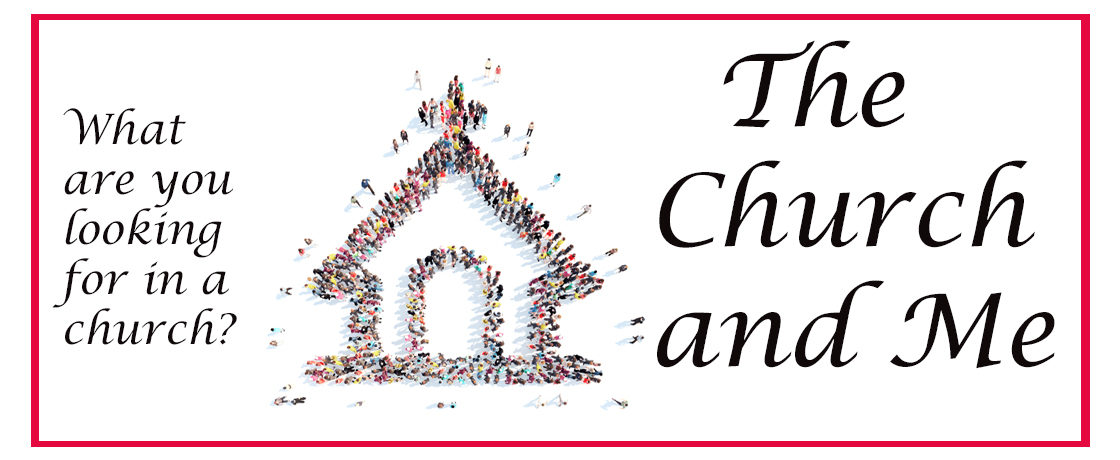The Church and Me
What are you looking for in a church?
What does the ideal church look like to you?
What important aspects do you look for when seeking a church to attend?
Jesus Promised To Build The Church
Matthew 16:18 He said, “Upon this rock I will build My church”. At that time Jesus did not define the church, nor disclose the nature of it.
The nature of the Church was not clear until the Apostle Paul was led by God to be the medium of the full revelation of the church as the body of Christ. Ephesians 3:1–7.
Church In America
Church membership in America has basically followed one of two patterns since its conception: an inclusive and an exclusive tradition. The inclusive tradition was carried over from European Christendom. It supports the concept of the church being coextensive with the territory. The inclusive concept saw everyone located geographically within a parish as eligible for baptism, which then signified membership in the church.
The exclusive tradition confined church membership to those who could give a credible profession of faith, sometimes requiring evidence of internal regeneration along with knowledge of saving doctrine and a morally upright life.
Church Choices For Today
Some classify churches as: Liberal or Conservative, Traditional or Contemporary, Charismatic or Dead,
Catholic or Protestant, Traditional or Emerging.
Toward the end of the nineteenth century, signs began to appear that churches would be changing from a focus on the Word of God, to a focus on Show Business.
A worldwide trend was beginning to develop that would set the course of human affairs and impact church life for the future. It was the emergence of entertainment— where amusements and being entertained have become the most important and time-consuming aspects of human life, discourse and focus.
In show business, truth is irrelevant. What really matters is whether we are entertained. Substance often counts for little; style is everything.
Churches have now conceived the idea that it is their duty to amuse the people. ~A. W. Tozer 1955
Nothing in Scripture indicates the church should lure people to Christ by presenting Christianity as an “attractive” option.
2 Corinthians 2:1 And I, brethren, when I came to you declaring unto you the testimony of God, came not with excellency of speech or of wisdom. 5 that your faith should not stand on the wisdom of man, but on the power of God.
Enemies of the Church
The ecumenical movement. Attempted through the World Council of Churches and other bodies to reform denominational groups into one centralized church body.
Pluralism. A philosophy that allows for a wide diversity of viewpoints and doctrines to co-exist within a single body.
The number of contradictory viewpoints that are tolerated increases. There is no specific, enduring truth that applies. The price tag for that historically has been the loss of biblical confessional purity of the churches.
Liberalism. The crisis the church is facing today is largely a result of the impact of the eighteenth-century Enlightenment on the church and the advent of what was called nineteenth-century liberalism. This liberalism focused on attacking the supernatural dimensions of historic Christianity
and denying the validity of biblical miracles.
The Emerging Church. In particular, the movement is a plea for reformation based first and foremost on perceptions of changes in the culture. Compare this idea with the Reformation in 1517 with Luther: Luther’s plea for change was based on perceptions that the church had departed from Scripture.
It was a call foremost to return to Scripture.
The perception that the culture has changed and, therefore, the church must adapt while still remaining in line with Scripture, is not an easy task. It is not that there is no validity to considering the culture. There is. However, too often churches and leaders today are not willing to pay the price to sort out and sift these ideas carefully through Scripture.
1 Corinthians 9:22 To the weak I became as weak, that I might gain the weak. I am made all things to all men, that I might by all means save some.
The flexibility and accommodation Paul speaks of is the flexibility and accommodation of the messenger, not the message, nor the convert! He does not want the Jews to remain as they are. He wants them to know Christ.
Paul has to flex not only to win some, but to participate in his very existence in the gospel: dying to self, taking up his cross, identifying with others, so that in the very style of his ministry, in his care for others, he is living out the gospel.
Christ came to identify with us and pay a price for us, but never to leave us in the state in which He found us.

